1
Which do you think is more valuable to humanity?a. Finding ways to tell humans that they have free will despite the incontrovertible fact that their actions are completely dictated by the laws of physics as instantiated in our bodies, brains and environments? That is, engaging in the honored philosophical practice of showing that our notion of "free will" can be compatible with determinism?orb. Telling people, based on our scientific knowledge of physics, neurology, and behavior, that our actions are predetermined rather than dictated by some ghost in our brains, and then sussing out the consequences of that conclusion and applying them to society? Of course my answer is b).Jerry A. Coyne
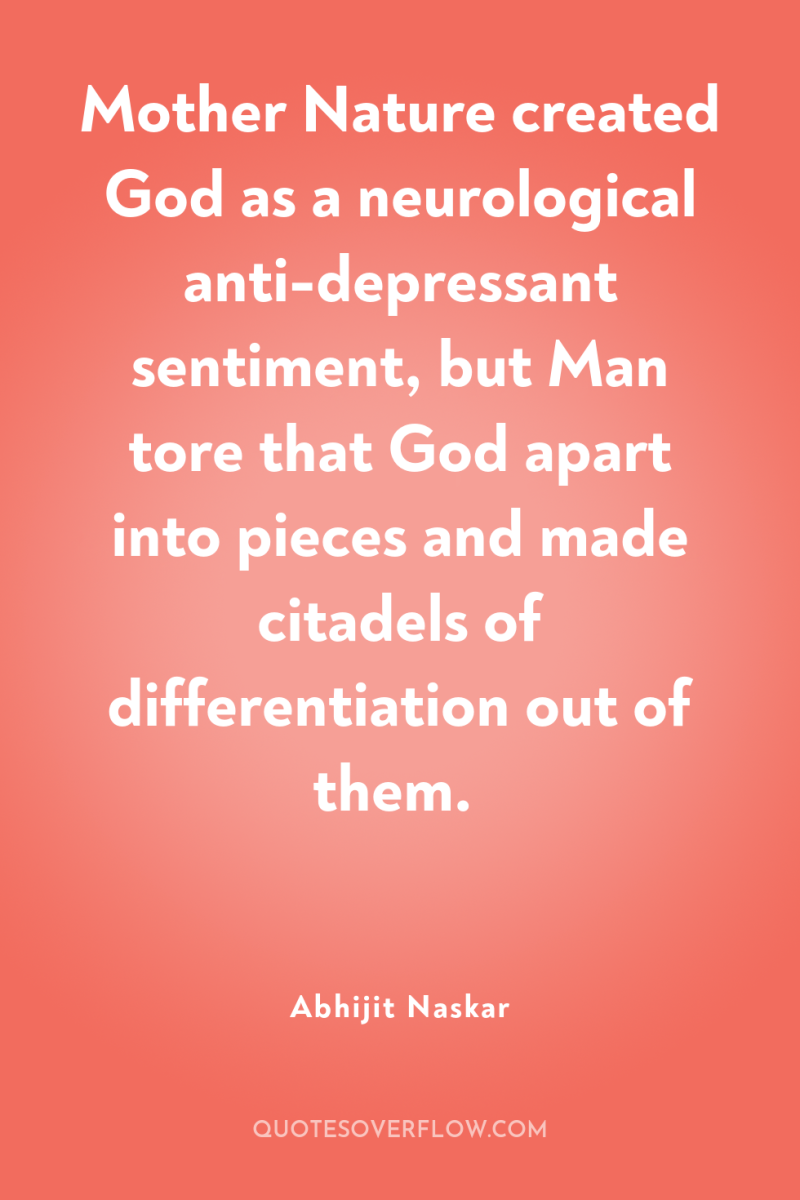
2
Mother Nature created God as a neurological anti-depressant sentiment, but Man tore that God apart into pieces and made citadels of differentiation out of them.Abhijit Naskar
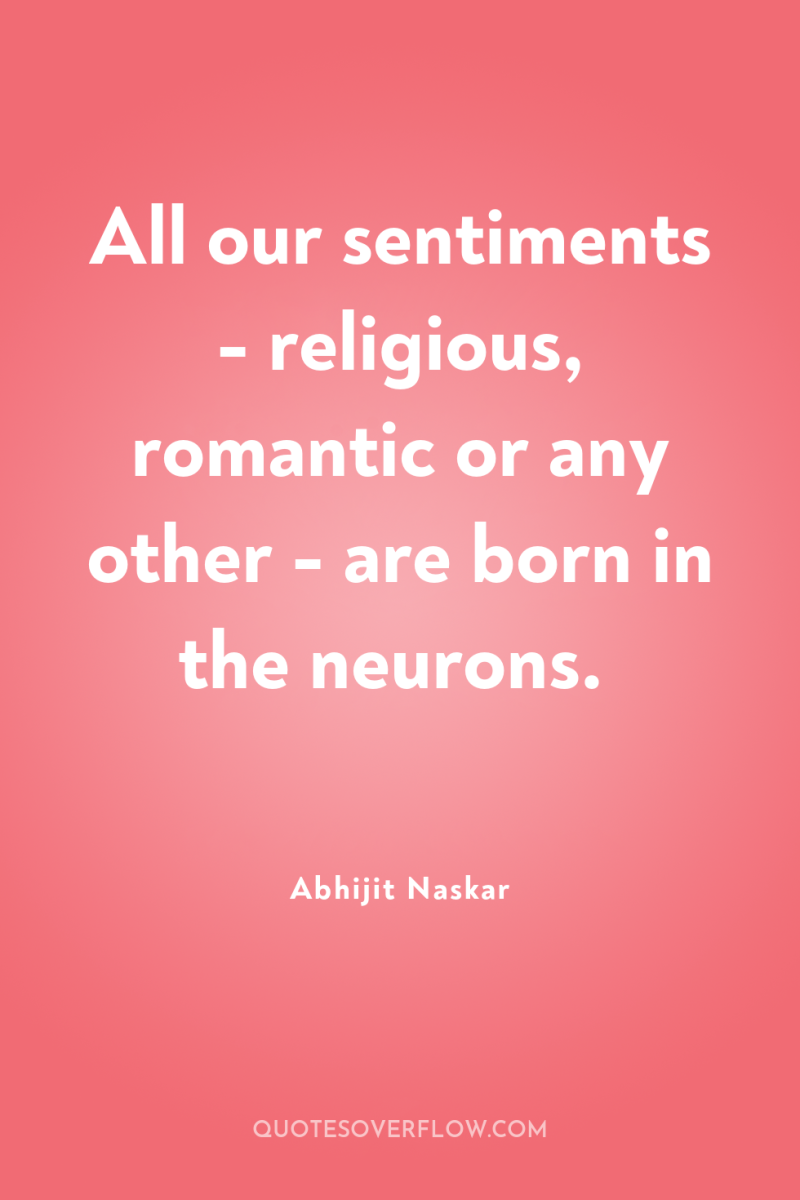
3
All our sentiments - religious, romantic or any other - are born in the neurons.Abhijit Naskar
4
Biologically speaking, you are the child of Mother Nature, and neurologically speaking, you are the heirs of immortal bliss.Abhijit Naskar
5
We gain from the new science of mind not only insights into ourselves - how we perceive, learn, remember, feel, believe and act - but also a new perspective of ourselves and our fellow human beings in the context of biological evolution.Abhijit Naskar
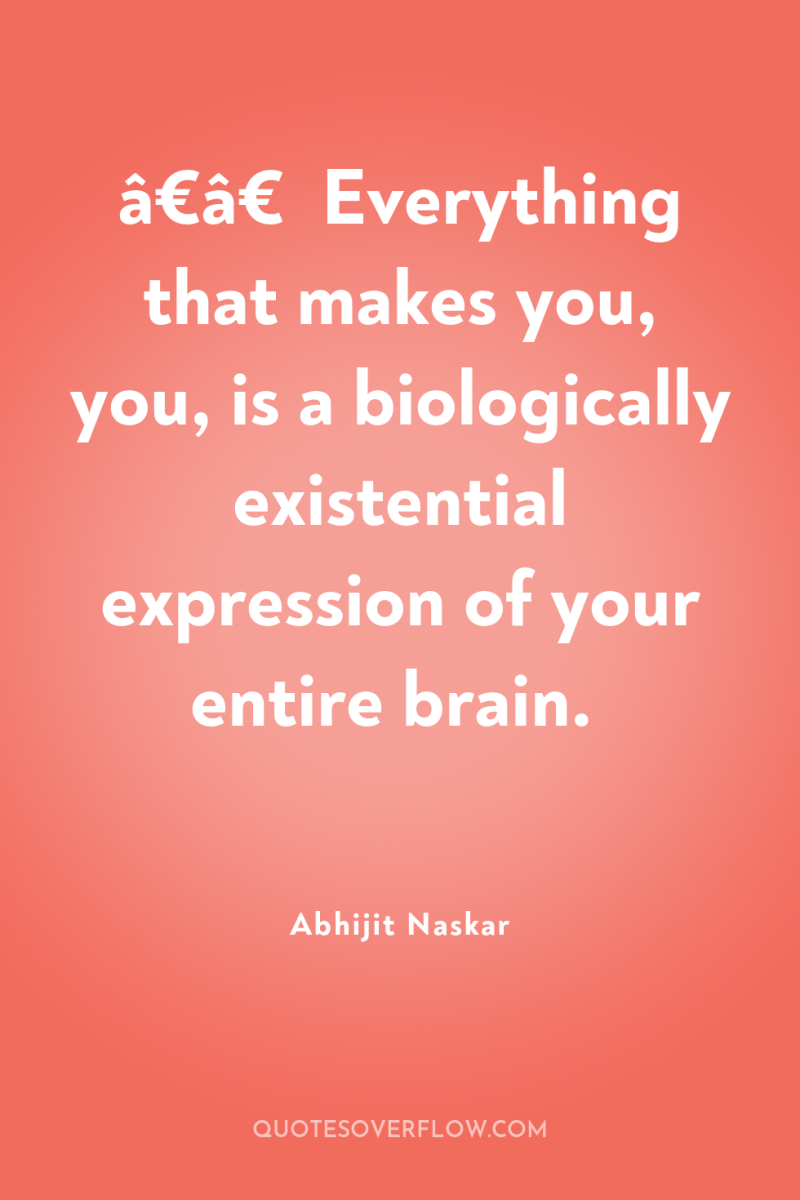
6
â€â€¹Everything that makes you, you, is a biologically existential expression of your entire brain.Abhijit Naskar
7
In the statistical gargon used in psychology, p refers to the probability that the difference you see between two groups (of introverts and extroverts, say, or males and females) could have occurred by chance. As a general rule, psychologists report a difference between two groups as 'significant' if the probability that it could have occurred by chance is 1 in 20, or less. The possibility of getting significant results by chance is a problem in any area of research, but it's particularly acute for sex differences research. Supppose, for example, you're a neuroscientist interested in what parts of the brain are involved in mind reading. You get fifteen participants into a scanner and ask them to guess the emotion of people in photographs. Since you have both males and females in your group, you rin a quick check to ensure that the two groups' brains respond in the same way. They do. What do you do next? Most likely, you publish your results without mentioning gender at all in your report (except to note the number of male and female participants). What you don't do is publish your findings with the title "No Sex Differences in Neural Circuitry Involved in Understanding Others' Minds." This is perfectly reasonable. After all, you weren't looking for gender difference and there were only small numbers of each sex in your study. But remember that even if males and females, overall, respond the same way on a task, five percent of studies investigating this question will throw up a "significant" difference between the sexes by chance. As Hines has explained, sex is "easily assessed, routinely evaluated, and not always reported. Because it is more interesting to find a difference than to find no difference, the 19 failures to observe a difference between men and women go unreported, whereas the 1 in 20 finding of a difference is likely to be published." This contributes to the so-called file-drawer phenomenon, whereby studies that do find sex differences get published, but those that don't languish unpublished and unseen in a researcher's file drawer. .Cordelia Fine
8
Some people with Tourette's have flinging tics- sudden, seemingly motiveless urges or compulsions to throw objects..... (I see somewhat similar flinging behaviors- though not tics- in my two year old godson, now in a stage of primal antinomianism and anarchy)Oliver Sacks
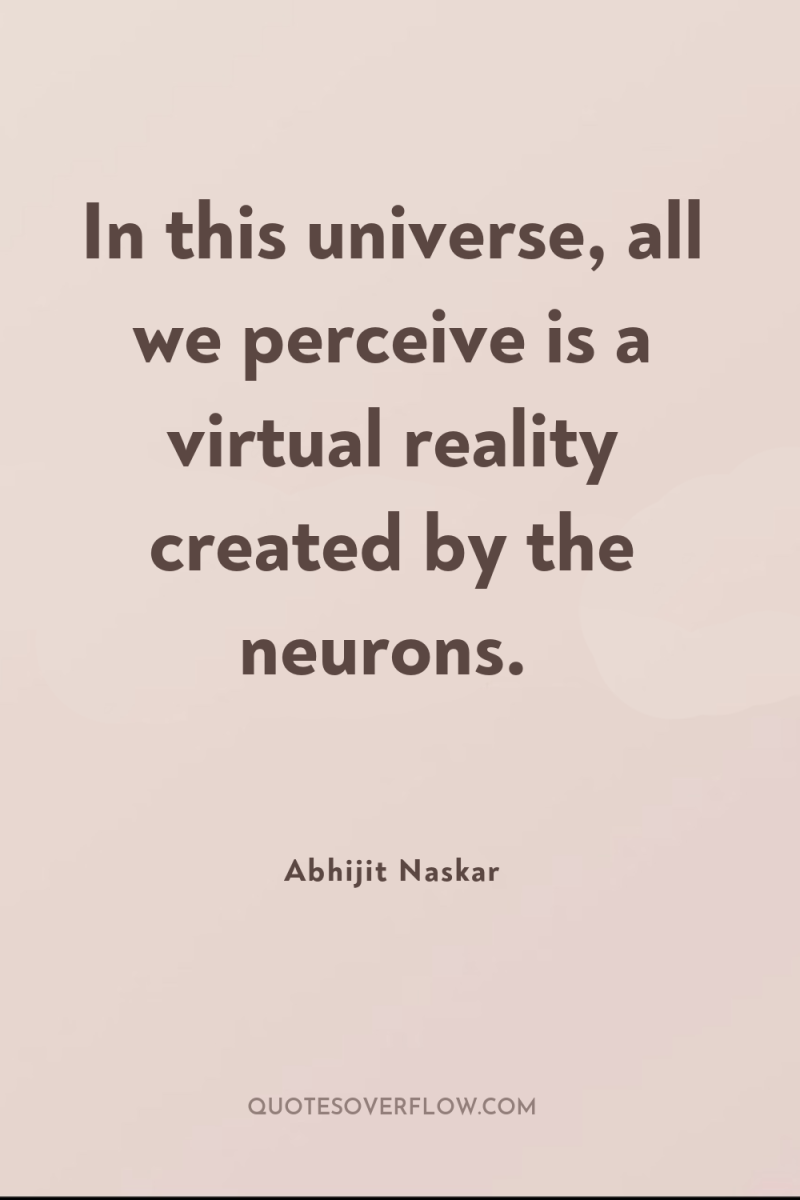
9
In this universe, all we perceive is a virtual reality created by the neurons.Abhijit Naskar
10
The spirits of the brain are directly connected to the testicles. This is why men who weary their imagination in books are less suitable for procreative functions...Unknown
11
The lessons of relationship that our primordial ancestors learned are deeply encoded in the genetics of our neurobiological circuits of love. They are present from the moment we are born and activated at puberty by the cocktail of neurochemicals. It’s an elegant synchronized system. At first our brain weighs a potential partner, and if the person ï¬ts our ancestral wish list, we get a spike in the release of sex chemicals that makes us dizzy with a rush of unavoidable infatuation. It’s the ï¬rst step down the primeval path of pair-bonding.Abhijit Naskar
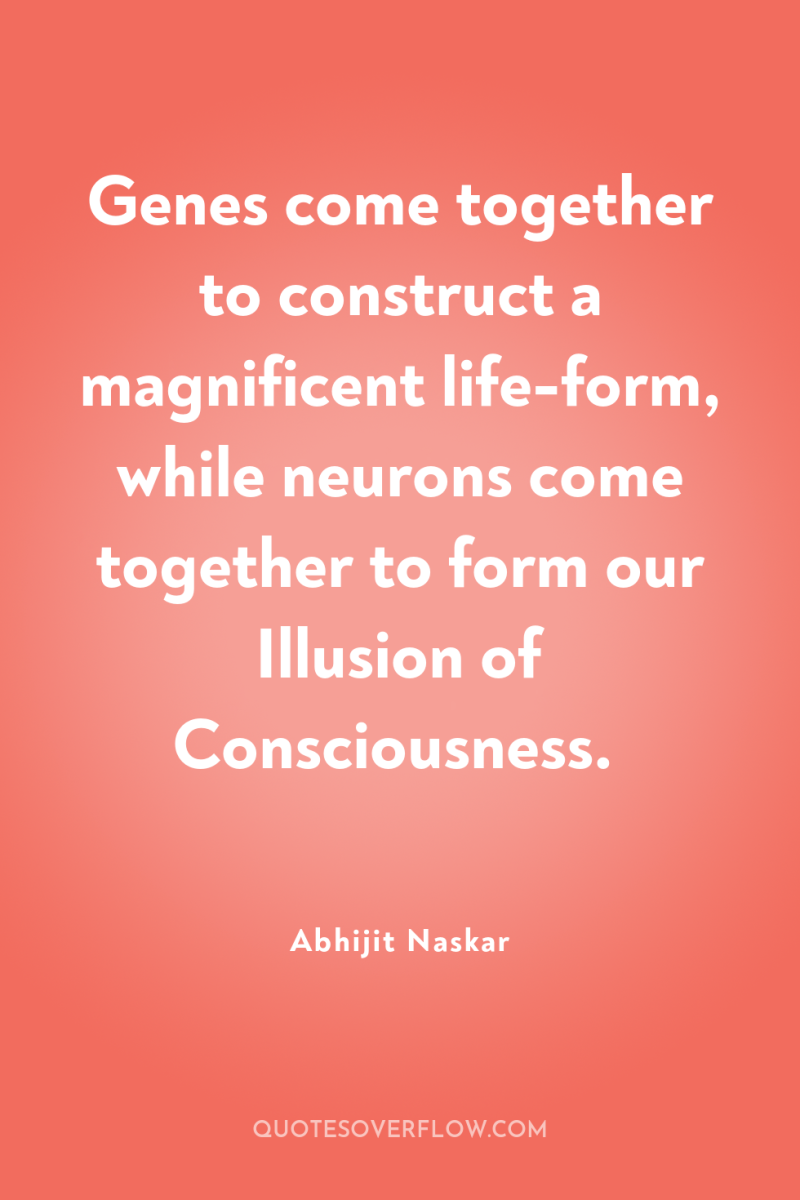
12
Genes come together to construct a magnificent life-form, while neurons come together to form our Illusion of Consciousness.Abhijit Naskar
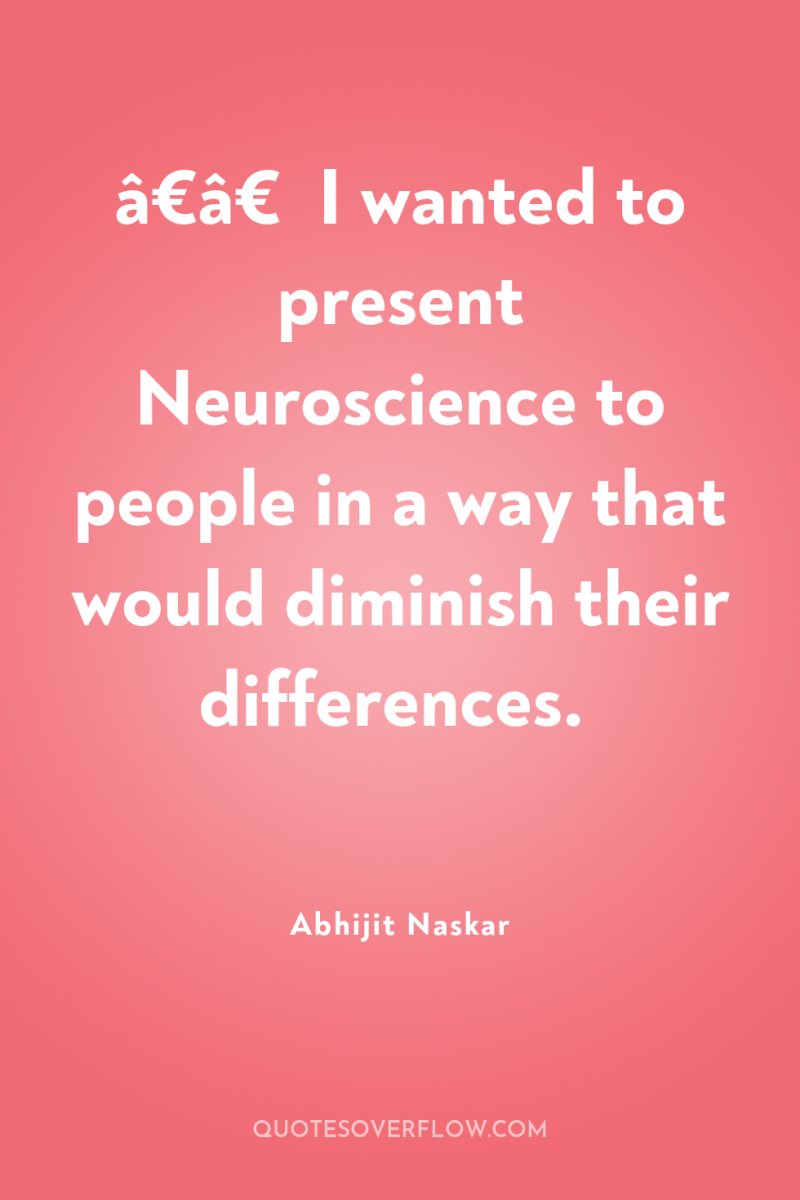
13
â€â€¹I wanted to present Neuroscience to people in a way that would diminish their differences.Abhijit Naskar
14
Neuroscience makes us connect with each other at an emotional level. It makes us make friends. It makes us dream more positively. It makes us more optimistic about ourselves and the world even in our darkest days. It makes us achieve our goal endowed with strength even through immense miseries. It allows us to attain the subjective reality of our fellow humans. Imbued with the understanding of the mind we can walk in the shoes of other people. .Abhijit Naskar
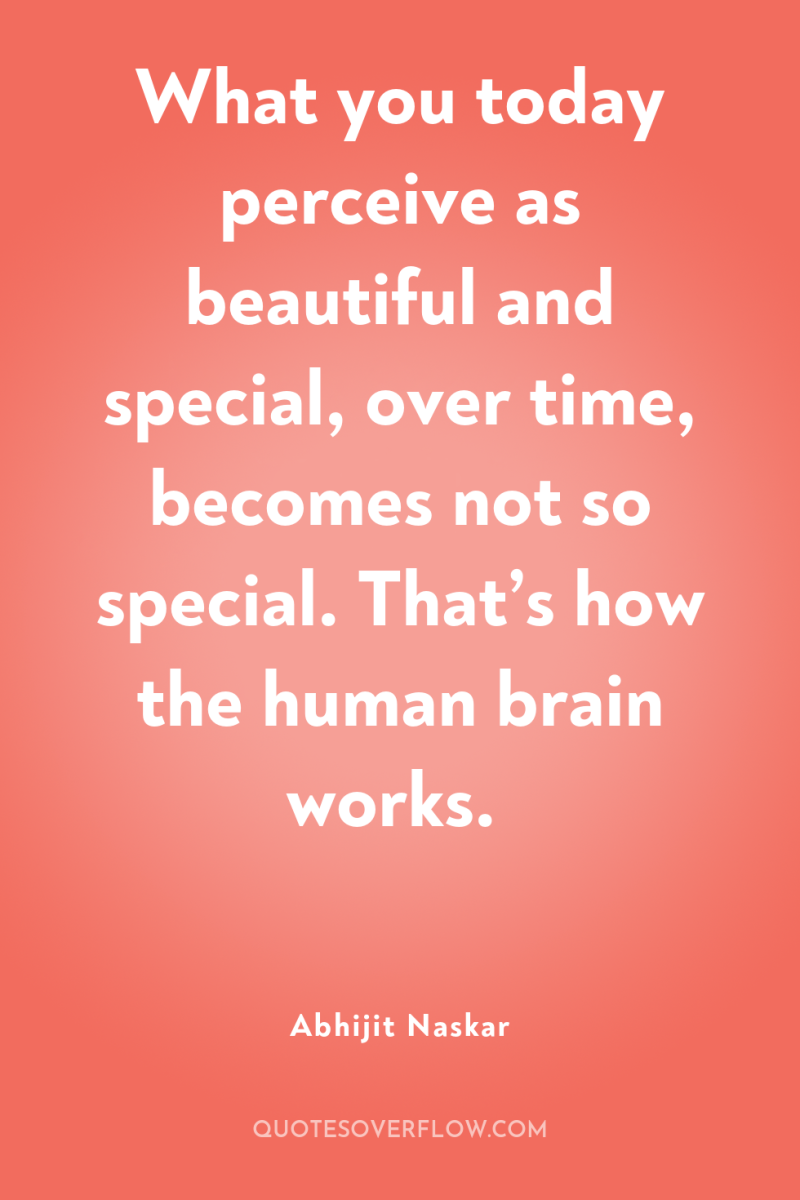
15
What you today perceive as beautiful and special, over time, becomes not so special. That’s how the human brain works.Abhijit Naskar
16
Memory is the coherence of life, that possesses all your emotions, and ambitions. Without it, your joyous as well as agonizing experiences of life won’t have any significance to you whatsoever.Abhijit Naskar
17
Memory is the binding foam of our mental life.Abhijit Naskar
18
If I ask you, are you conscious right now? You'd go right ahead and tell me - yes. That's because your conscious mind is constructing an awareness in you about everything around you. And underneath that operation of your conscious mind, there are billions of neurons working in proper harmony.Abhijit Naskar
19
We are but a bunch of neurons.Abhijit Naskar
20
Neuron is to Consciousness, what D.N.A. is to Life. Thus, Biology of Mind is to the twenty-first century, what Biology of Life was to the twentieth century.Abhijit Naskar
21
A man does not consist of memory alone. He has feeling, will, sensibility, and moral being.Alexander R. Luria
22
I guess I was sad that love was not real? Or not all that real, anyway? I guess I was sad that love could feel so real and the next minute be gone, and all because of something Abnesti was doing.George Saunders
23
Reality is neurology, and is not absolute.David Cronenberg
24
â€â€¹The universe perceives itself through us, or to be more specific, through our neurons.Abhijit Naskar
25
It is difficult to overstate the importance of understanding mirror neurons and their function. They may well be central to social learning, imitation, and the cultural transmission of skills and attitudes–perhaps even of the pressed-together sound clusters we call words. By hyperdeveloping the mirror-neuron system, evolution in effect turned culture into the new genome. Armed with culture, humans could adapt to hostile new environments and figure out how to exploit formerly inaccessible or poisonous food sources in just one or two generations–instead of the hundreds or thousands of generations such adaptations would have taken to accomplish through genetic evolution. Thus culture became a significant new source of evolutionary pressure, which helped select brains that had even better mirror-neuron systems and the imitative learning associated with them. The result was one of the many self-amplifying snowball effects that culminated in Homo sapiens, the ape that looked into its own mind and saw the whole cosmos reflected inside.V.S. Ramachandran
26
Each day I wake up with a naive perspective of life and universe, and walk towards understanding a little more about the true nature of human perception with all its vivacious nuances and behavioral expressions.Abhijit Naskar
27
Through the sacred verses filled with violence and self-righteousness, the minds of the angry individuals find a way to get rid of all their misery. At that unstable state of consciousness, they are drawn to the description of the Holy War. They visualize a glimmer of hope. They feel absolutely immersed in it. Finally when they emerge as holy warriors, they are no longer humans, from the emotional perspective. They emerge as wild beasts, neurologically almost unable to feel human emotions, like empathy, love, kindness and compassion. Consequently the whole world faces the wrath of the most primitive of all human elements in the name of God’s judgment. .Abhijit Naskar
28
â€â€¹God is hardwired within the neural circuitry.Abhijit Naskar
29
Consciousness is simply the brain’s neural response to its surrounding environmental stimuli. Hence when the neural circuits malfunction, Consciousness tends to malfunction as well.Abhijit Naskar
30
The Kingdom of God is an earthly experience which manifests in an unearthly manner.Abhijit Naskar
31
Even though it is common knowledge in our field of Neuroscience, I take immense pleasure every time I realize that our perception of the whole universe emerges from the activity of the little specks of jelly inside our skull.Abhijit Naskar
32
It's been long since thinking humanity has learnt that love is a majestic creation of the brain, yet that knowledge hasn't made love be deemed any less glorious. Then why should it threaten the religious believer to learn that divinity as well is a natural creation of the brain?Abhijit Naskar
33
Women, churchgoers, and conservative were more likely than men, nonchurch goers, and liberals to disagree with the reductionist (neural) account of human life.Andrew Ferguson
34
Pathology can indeed evoke experiences of Absolute Godliness, but not all God experiences are caused by pathology. They can also occur due to disturbance in the geomagnetic field of our planet, consumption of psychedelics, excruciatingly extreme level of stress during a near- death situation, or ultimately through a natural and healthy procedure of meditation or/and prayer.Abhijit Naskar
35
Recently, the search for what he calls "the splinters that make up different attention problems" has taken Castellanos in a new direction. First, he explains that your brain is far less concerned with your brilliant ideas or searing emotions than with its own internal "gyroscopic busyness, " which consumes 65 percent of its total energy. Every fifty seconds, its activity fluctuates, causing what he calls a "brownout." No one knows the purpose of these neurological events, but Castellanos has a thesis: the clockwork pulses enable the brain's circuits to stay "logged on" and available to communicate with one another, even when they're not being used. "Imagine you're a cabdriver on your day off, " Castellanos says. "You don't need to use your workday circuits on a Sunday, but to keep those channels open, your brain sends a ping through them every minute or so. The fluctuations are the brain's investment in maintaining its circuits online.Winifred Gallagher
36
Genetics, accidents of birth or events in early childhood have left criminals' brains and bodies with measurable flaws predisposing them to committing assault, murder and other antisocial acts... Many offenders also have impairments in their autonomic nervous system, the system responsible for the edgy, nervous feeling that can come with emotional arousal. This leads to a fearless, risk-taking personality, perhaps to compensate for chronic under-arousal. Many convicted criminals, like the Unabomber, have slow heartbeats. It also gives them lower heart rates, which explains why heart rate is such a good predictor of criminal tendencies. The Unabomber, Ted Kaczynski, for example, had a resting heart rate of just 54 beats per minute, which put him in the bottom 3 per cent of the population.Adrian Raine
37
Each of us is on our own trajectory — steered by our genes and our experiences — and as a result every brain has a different internal life. Brains are as unique as snowflakes.David Eagleman
38
Planning. Short-term memory. Attention. At first glance, these three frontal lobe functions can seem like diverse activities that just happen to be packed into the same brain region. But on closer inspection it turns out that they are facets of the same basic phenomenon of 'restraint'. Planning restrains our brains from wandering from a chosen path of activity. Short-term memory retrains sensory cortex from moving on to different imagery. Attention constrains the kind of sensory data admitted to sensory cortex.Robert Jourdain
39
My book contains texts that I wrote during college, medical school and during my residency of neurosurgery. I could set the book �Thoughts from the hospital" as clippings thoughtsJulio Pereira